Hey, Dmytro Sokhach here — co-founder of the link-building agency Editorial.Link.
I’ve been deep in SEO since 2007, watching link-building evolve with every algorithm update.
Fast forward to 2025 — AI Search is flipping the switch on how we build links once again.
In this post, I’ll walk you through which link-building strategies are still worth your time, which ones are fading out, and the emerging trends you need to jump on — so your backlinks and mentions don’t just exist, but perform.
Why AI Search Is Changing Link-Building
AI Search — anything like Google Overviews, ChatGPT, Perplexity, etc. — isn’t just listing blue links anymore. It pulls summarized answers from multiple sources and serves them up instantly.
That means ranking in top results alone isn’t enough — getting mentioned, even without a backlink, can be just as powerful.
For link-building, this shifts the focus. It’s not only about chasing SEO metrics like DR or traffic. Brand visibility — mentions, authority, and presence across the web — matters more than ever.
If your name is in trusted, relevant content, you’re more likely to appear in AI search results — link or no link.
Do Backlinks Still Influence Your Ranking In AI Search?
Yes, 100%.
Editorial.Link’s 2025 survey reveals that 73.2% of 518 SEO professionals worldwide believe backlinks continue to impact your visibility in AI search results.
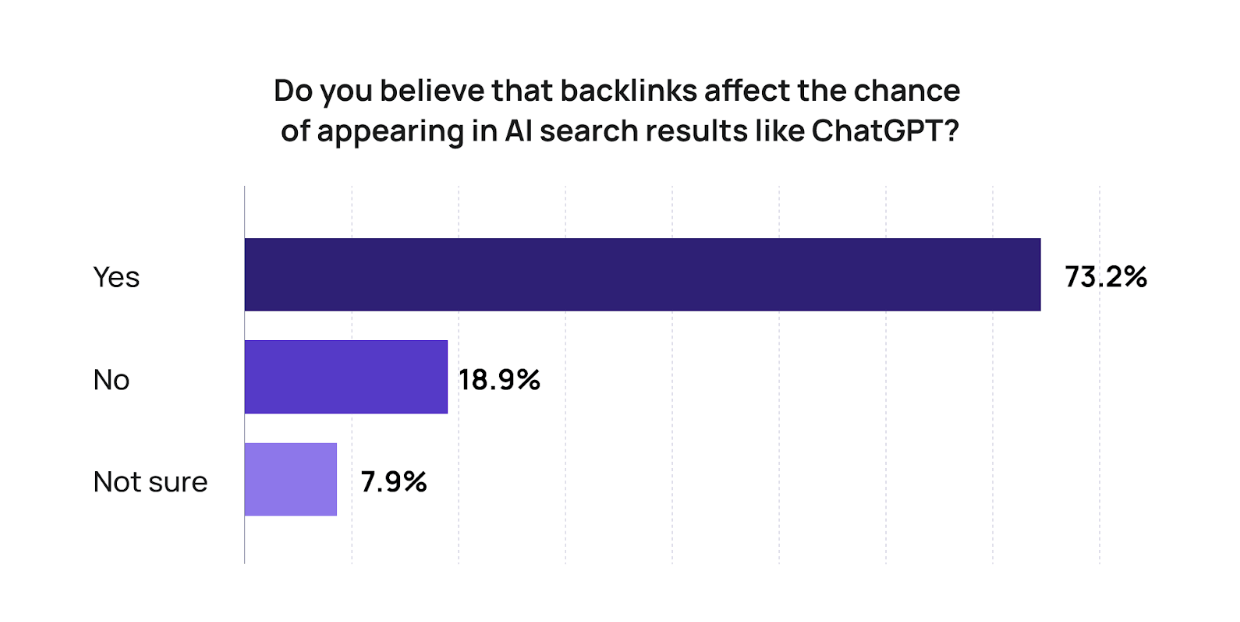
And here’s why.
AI doesn’t evaluate backlinks directly — it looks at how those links help your content rank in traditional search. So if Google sees your site as trustworthy thanks to strong backlinks, there’s a much better chance AI will surface your content in its answers.
💡Pro-tip! Trending AI models like Gemini and Bard purely rely on Google’s search index to retrieve information. ChatGPT and Bing AI use Bing Search APIs, ranking content based on its visibility in Bing. Perplexity follows suit, pulling in and citing sources directly in its responses — and Reddit Answers is playing the same game.
Why is that so, you might ask?
Because when an AI searches the web, it doesn’t crawl EVERYTHING — it uses APIs that return a curated, RANKED set of results. Since these APIs prioritize pages through search ranking signals, backlinks indirectly impact AI’s content discovery.
This takeaway can be backed up by Ahrefs’ 2025 study, which found that 76.10% of pages cited in AI Overviews rank in the top 10 search results — showing a strong overlap between traditional rankings and AI citations.
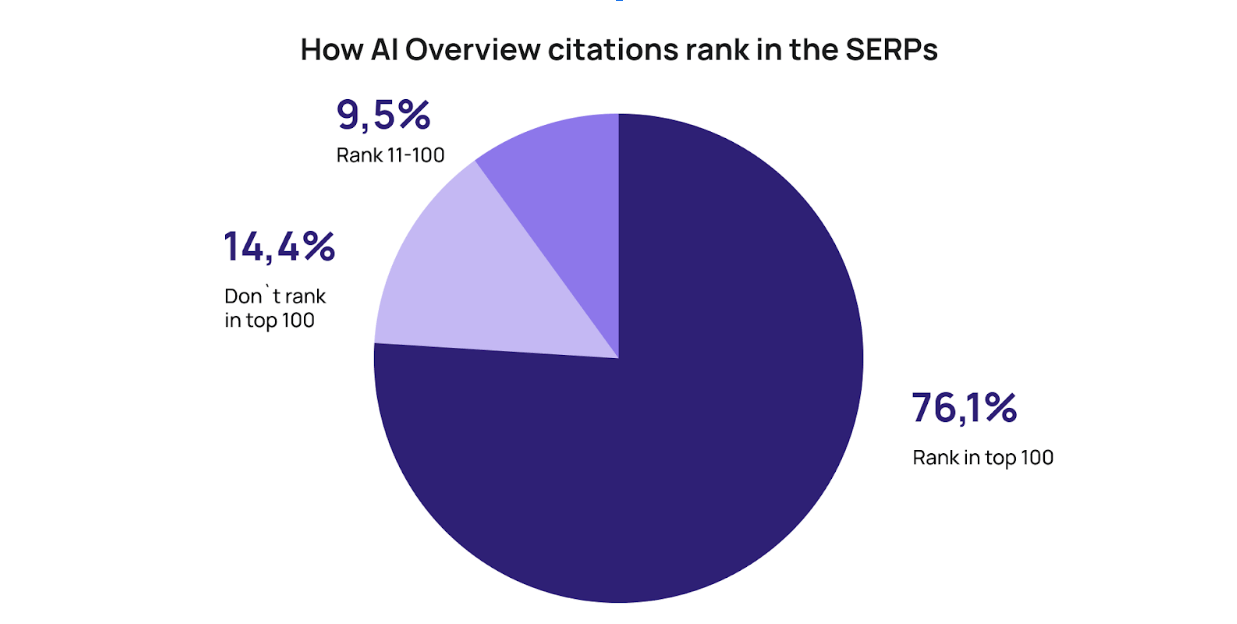
If you take a moment to look at any of those top 10 sites, you’ll see they all have solid backlink profiles — which just proves once again how important quality links are for ranking.
💡Pro-tip! Matter of fact, according to Ahrefs’ Brand Radar as of June 2025, AI Overviews are more prominent than ever — now appearing on 14.3% of all SERPs.
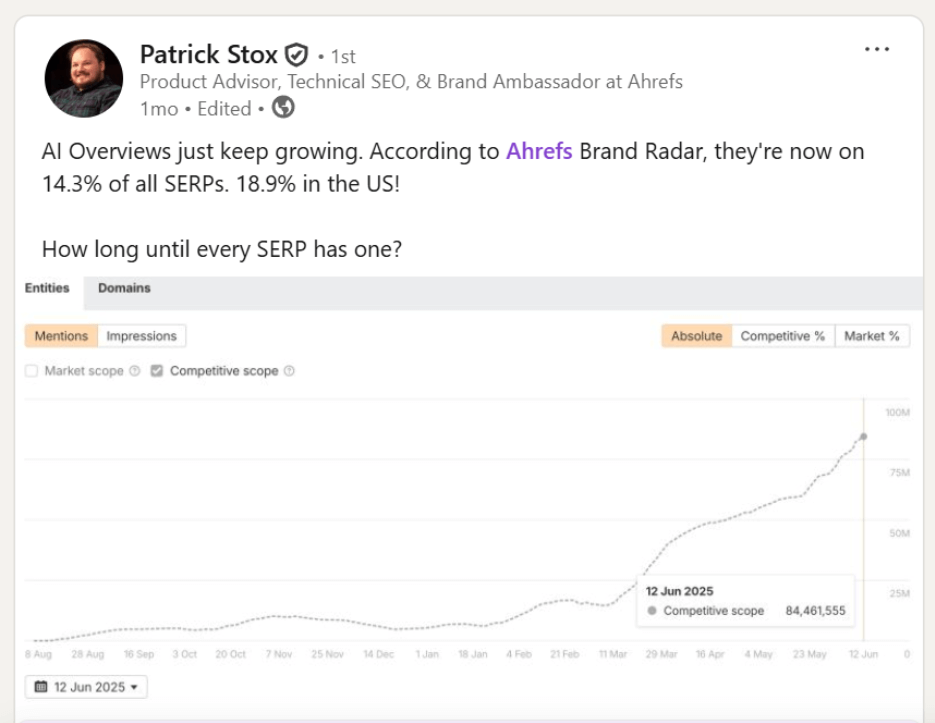
👉Bottom line: Strong backlinks triple your chances of being linked to, mentioned, and referenced by AI tools. In fact, earning great backlinks helps you rank well both in traditional search and in AI-powered results. And it works both ways — if you’re not ranking in search, AI tools probably aren’t citing you either.
4 Effective Link-Building Strategies For The AI Search Era
Since I’m mostly sharing from experience, here’s what’s been working well for us at Editorial.Link when sourcing backlinks that also perform great in AI Search.
1. Digital PR link-building
Digital PR works just like traditional PR — but instead of only media coverage, you’re earning high-authority backlinks from publishers, content creators, and media outlets.
And it’s not just a buzzword — 48.6% of SEO experts surveyed by Editorial.Link in 2025 ranked it as the most effective link-building strategy out there.
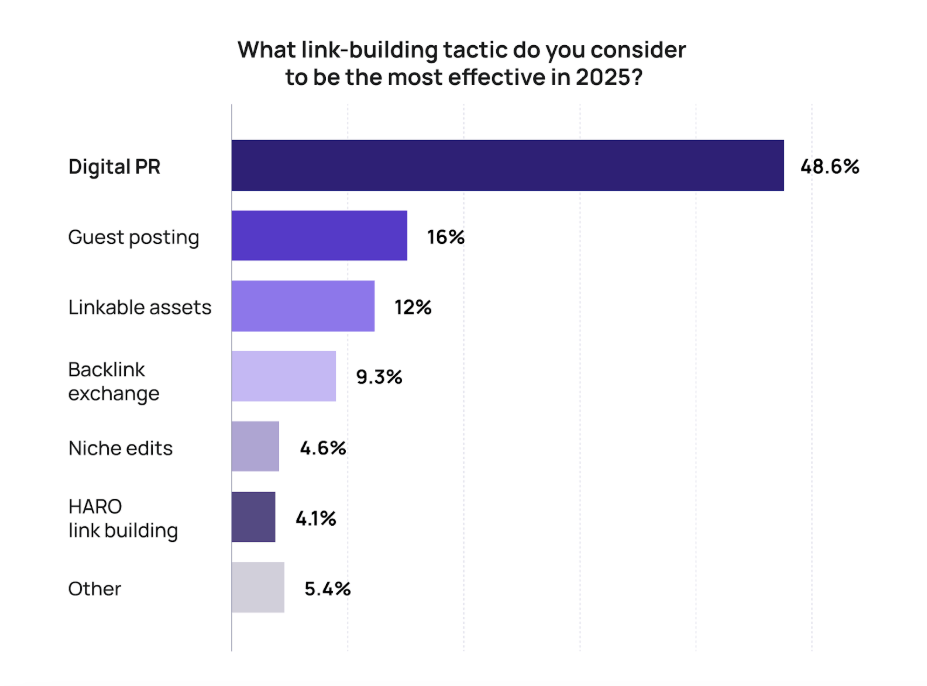
So, how do you actually make digital PR work?
According to BuzzStream’s 2025 State of Digital PR Report, the top-performing tactics are:
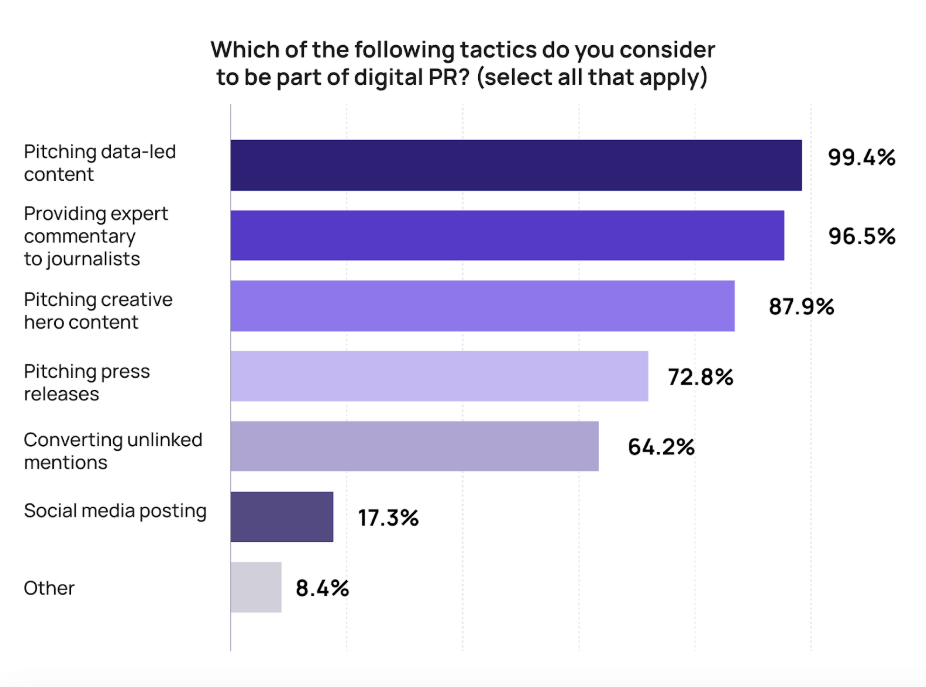
At Editorial.Link, we love building PR campaigns around our own data-packed annual surveys — like the 2025 State of Link-Building, just to name one.

This wasn’t just a stats grab — we hit up 518 SEO pros worldwide, pitched it to LinkedIn influencers, slid it into newsletters, got it reposted… basically, we made sure it got seen.
The first step is to bring industry leaders on board while the survey’s still in progress. One influencer takes part, spreads the word, name-drops a few familiar faces — and just like that, more and more people start jumping in.
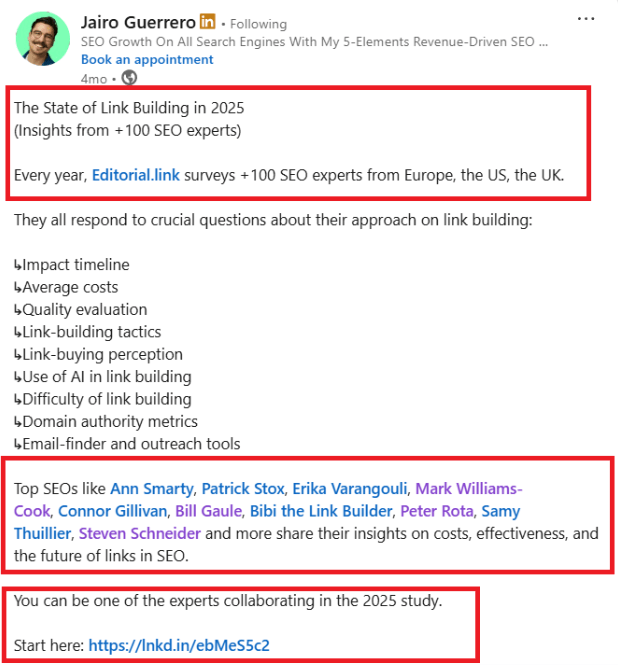
When the report goes live, contributors naturally want to see — and be seen. They repost it, tag others, and spread the word, turning your survey into a shareable asset that keeps gaining traction.
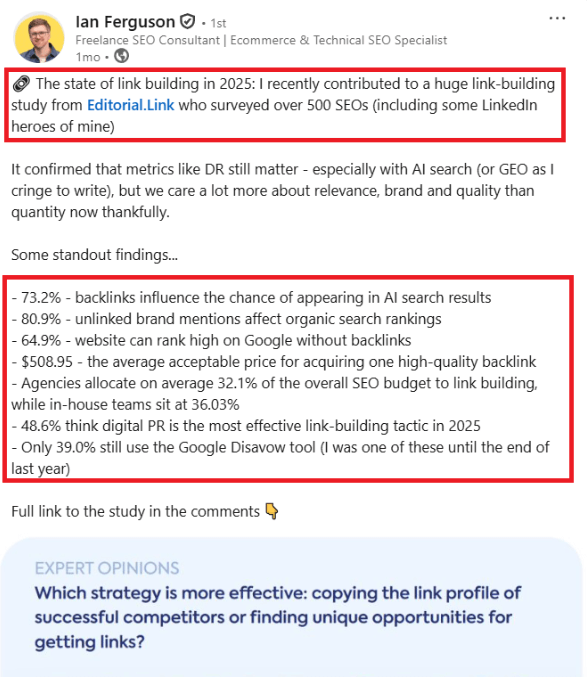
The third step is getting your survey stats cited in publications as valuable insights. This is where you can get creative — reach out to editors, site owners, and publishers to let them know this data is already available and could make a great addition to their content.
💡Pro-tip! Reach out with respect and a genuine tone. Show that you’re bringing value to the table, not just trying to get something back.
Here’s how we got in touch with Danny Goodwin, Editorial Director at Search Engine Land, with a friendly pitch right when our survey went live:
Subject: 73% of SEOs say links still matter in AI Search — check this out!
Dear Danny,
I’m Dmytro Sokhach, co-founder of Editorial.Link, and a long-time admirer of Search Engine Land.
Each year, we publish original link-building surveys featuring fresh data here at Editorial.Link. Since SEL is the go-to source for cutting-edge SEO insights, I thought you might be interested in taking a look at our 2025 report — especially the findings on AI Search.
Feel free to check it out: https://editorial.link/link-building-statistics/
If any of the data fits into your upcoming content, I’d be more than happy to assist.
Best regards,
Dmytro
The results exceeded our expectations — Danny included our stats in his recent piece about the relevance of backlinks for AI Search. See for yourselves!
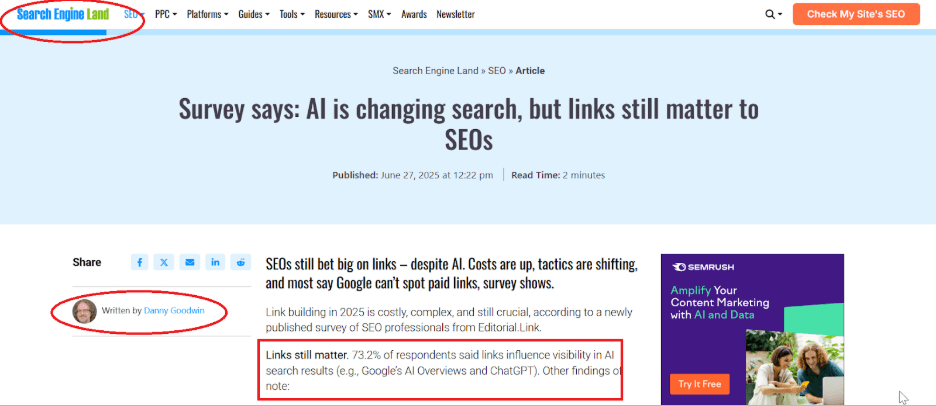
🔑Bottom line: This three-step digital PR strategy truly works — we saw it in action with last year’s 2024 State of Link-Building Report, which earned us a solid batch of PR backlinks from big names like NeilPatel.com, SiegeMedia.com, BuzzStream.com, and plenty more.
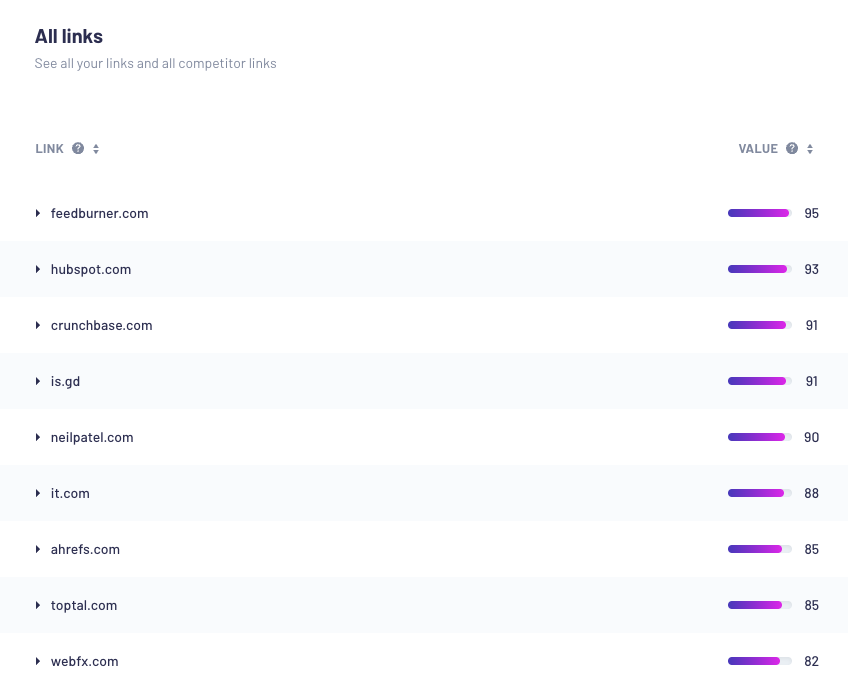
2. Listicle link-building
Listicle link-building is securing backlinks in listicles — AI’s most loved content to pull info from.
That’s because listicles are structured for clarity — short items, bold headlines, and bullet points make them easy for AI to parse and extract key takeaways, unlike long, text-heavy reads.
On top of that, listicles usually rank on high-authority sites with solid backlink profiles — which tells AI your content’s legit and worth mentioning in its answers.
And let’s be real — listicles embody what people are actually Googling. They are built around long-tail search queries like “Best tools for X” or “Top strategies for Y” — all reflecting real user intent, hence are prime candidates for getting into featured snippets.
💡Pro-tip! Find keywords that lots of people are searching for, then get your brand featured in listicles that cover those topics.
For instance, to strengthen our position for “best link-building services,” we landed a link in a Gotch SEO Academy listicle, which made quite a difference for our visibility.
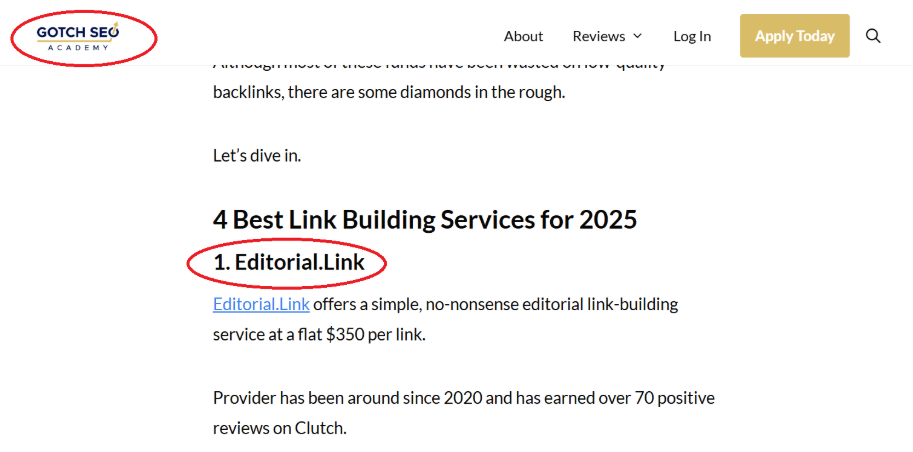
Of course, along with the other listicles we’ve been featured in, this definitely helped us get included in AI Overviews for searches like “best link-building services.”
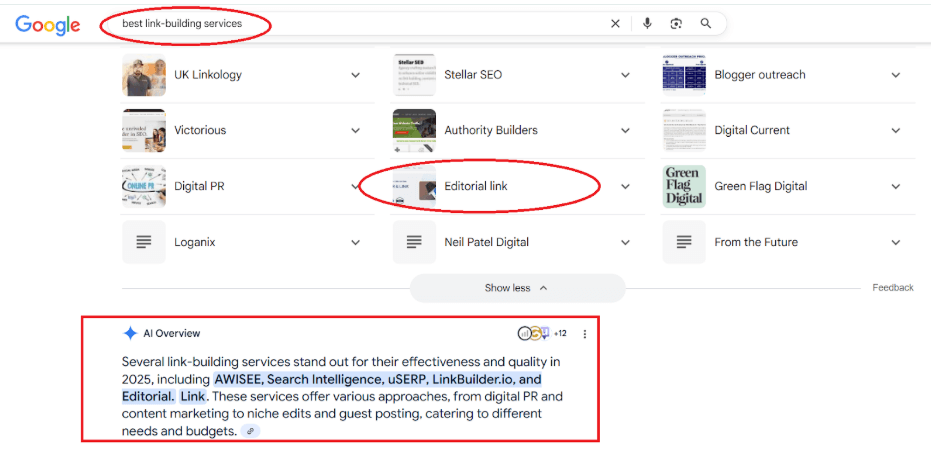
3. Brand mentions
Mentions do wonders for brands for appearing in AI Search — even without a direct link. All it takes is a mention in the right content (on a good domain) alongside other big names — and AI Overviews could have you showing up in no time.
The more “quality” mentions you get, the better — AI models cross-reference multiple sources before deciding what to include in their responses, so consistent visibility builds trust.
Just take a look at the top 20 domains most frequently cited in AI Overviews in 2025, as recently reported by Semrush. They’re all trusted, high-authority sites that dominate organic search too.
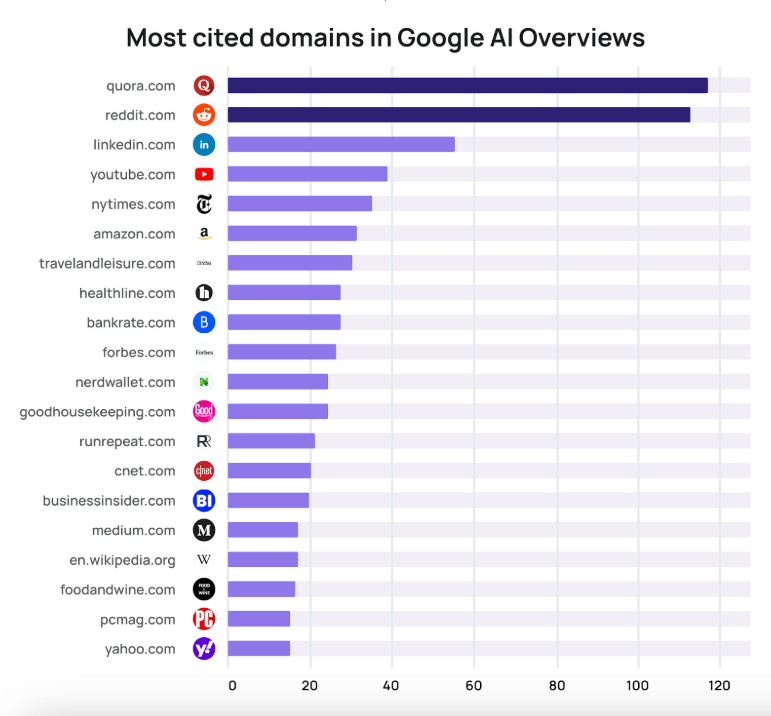
Want to show up in AI Search? Start by getting backlinks from those same sources!
You’ll see a similar pattern in ChatGPT and Perplexity search results — they tend to pull data from long-established domains like Wikipedia, major news outlets like Reuters, and popular platforms like JustWatch.com, according to Ahrefs’ Brand Radar.
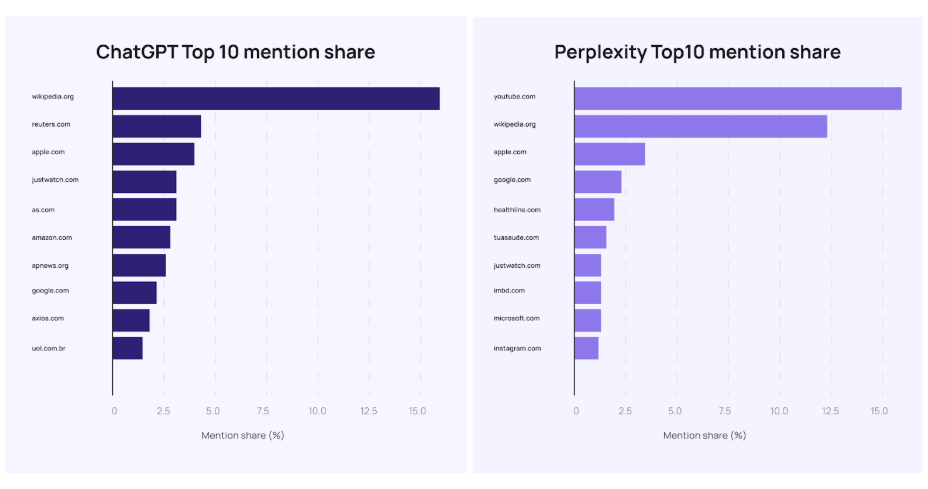
Since unlinked mentions still count for AI, why not generate them for free on HARO?
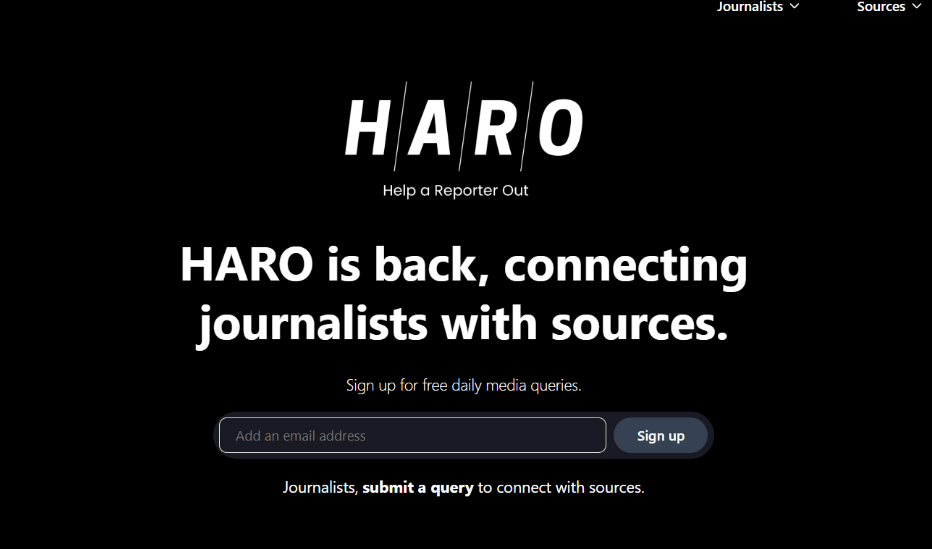
It’s recently been revamped by Featured, making it easier to answer queries and collaborate with journalists, authors, and creators on content that matters in your niche.
💡Pro-tip! Whenever possible, you can turn unlinked brand mentions into actual backlinks by politely reaching out to website owners — especially if the host has strong authority.
The new version of HARO, for instance, often features big-name sources looking for expert quotes — so why not seize the opportunity to ask for a backlink from a reputable domain?
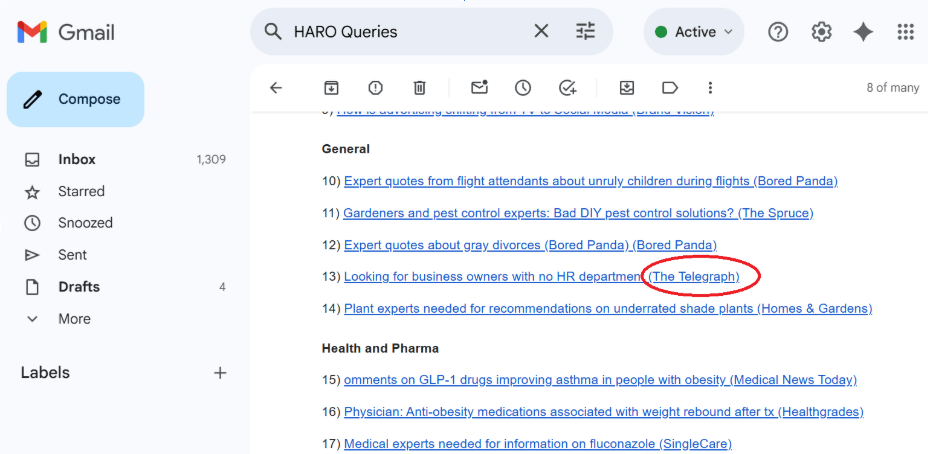
4. Reddit link-building
Q&A platforms like Quora and Reddit are no longer just spam-filled forums. In fact, Reddit has become the second most-cited website in Google AI Overviews, according to Semrush.
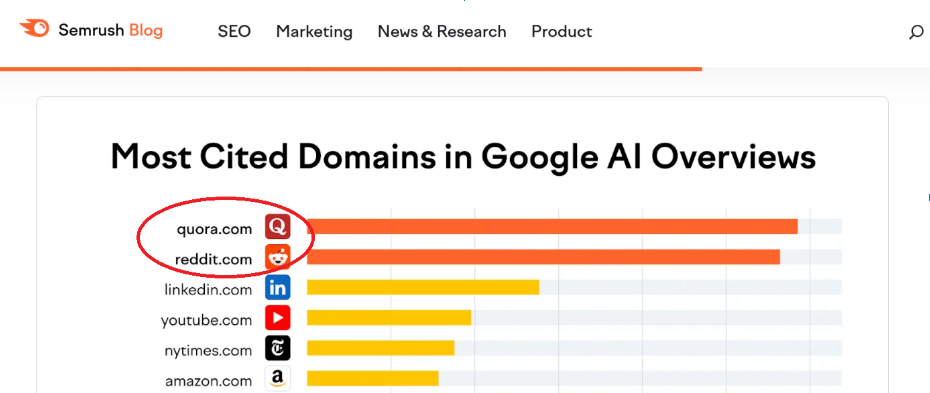
That’s because Reddit excels at addressing niche, uncommon questions, or brand new, less explored topics, which makes its answers detailed sources for AI when handling highly specific prompts.
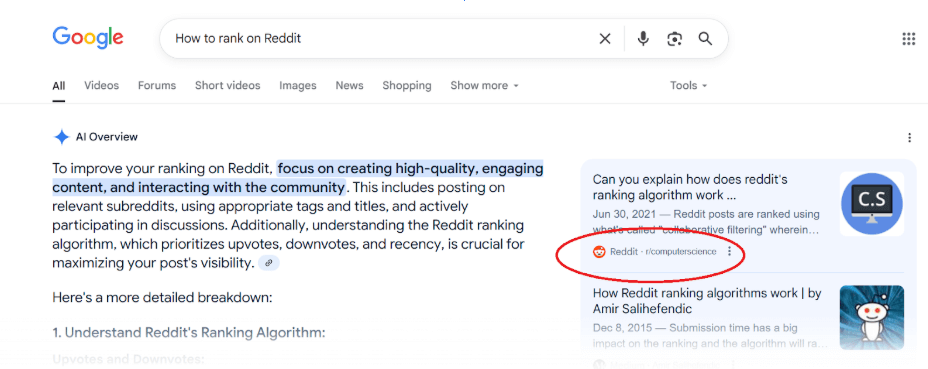
💡Pro-tip! Another possible reason Reddit answers perform so well? Google’s partnership with Reddit lets it train AI with their data. But hey, no biggie😁
You’ve probably fallen down a Reddit rabbit hole before — but how do you actually get your links in there? Simple: create content that answers niche questions people are Googling but still struggling to find clear info on.
When your content actually helps, Redditors notice.
Someone dropped a link to our 2025 State of Link-Building Report in response to a post asking, “Do backlinks really matter in AI search?” — perfect example of value doing the work for you.
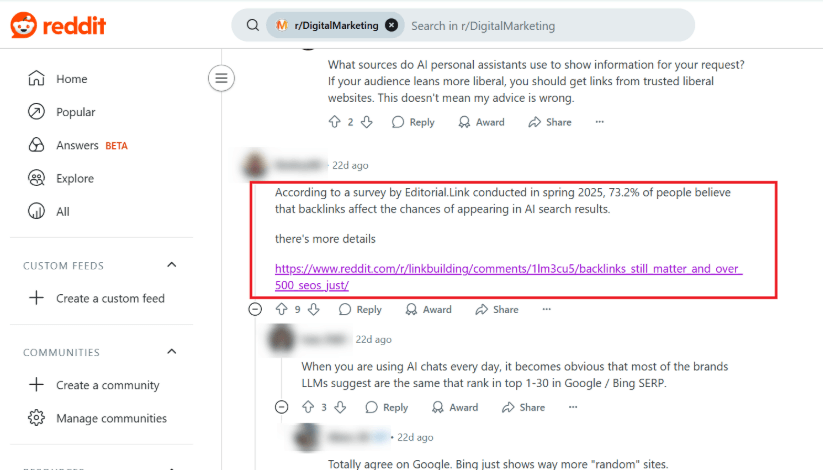
Here’s another tactic brands use: joining Reddit communities to regularly post content and answer niche-specific questions under their brand name.
See how Semrush does it.
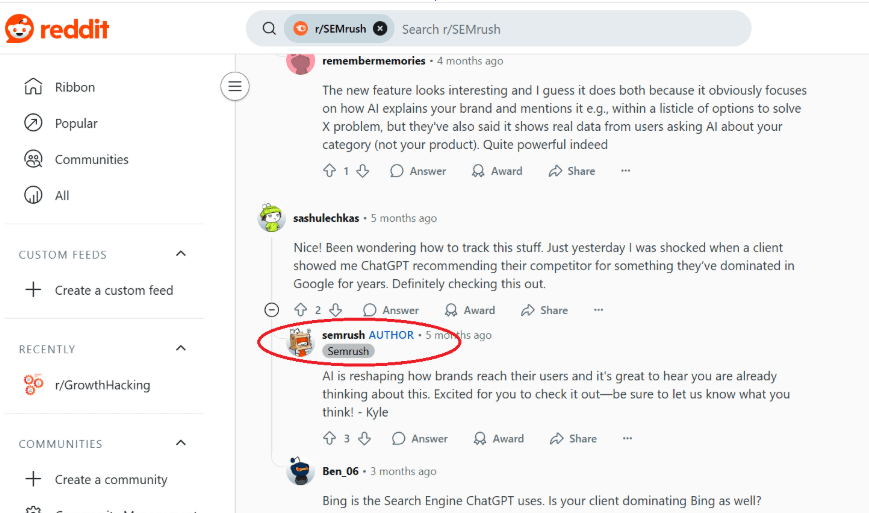
Why bother? Regularly showing up builds niche authority and gets you seen. AI takes notice of that.
How to Measure Success in the AI Search Era
New era, new metrics!
Forget chasing DR only like it’s 2019. With AI Search on the rise, your brand’s influence is now measured by:
👉 Where AI mentions you.
👉 Whether your insights get quoted.
👉 How often you appear in Google AI Overviews.
Think you should be grinding through all this monitoring yourself? Nope. Tools are evolving right alongside these shifts.
For example, Morningscore already provides features to track AI Search performance with a ChatGPT tracker and Google AI Overviews tracker that keeps developing.
All tools are in a race to provide AI Search features, and other tools like Ahrefs, SE Ranking, and SurferSEO are developing AI Search visibility features as well.
Final Words
If someone tries to tell you backlinks don’t matter for AI Search rankings — just smile and move on.
Backlinks are still a big deal for search engines — they’re the main source of info that backs up AI overviews and search tools pulling data from all over the web to give you answers.
But not all backlinks are the same. Only links from trusted, high-authority sites really tell Google and the others that you’re worth ranking — whether in classic search results or AI-powered ones.
Put simply, good backlinks from solid sites do double duty—they help you show up higher in regular search and get on AI search radars too.
Mentions also play a relevant role in AI search rankings — but again, only when they come from credible, authoritative sources.
👉Bottom line: make it a habit to earn quality backlinks and track your mentions from reliable sources — soon enough, AI search will start noticing you. I guarantee it.

